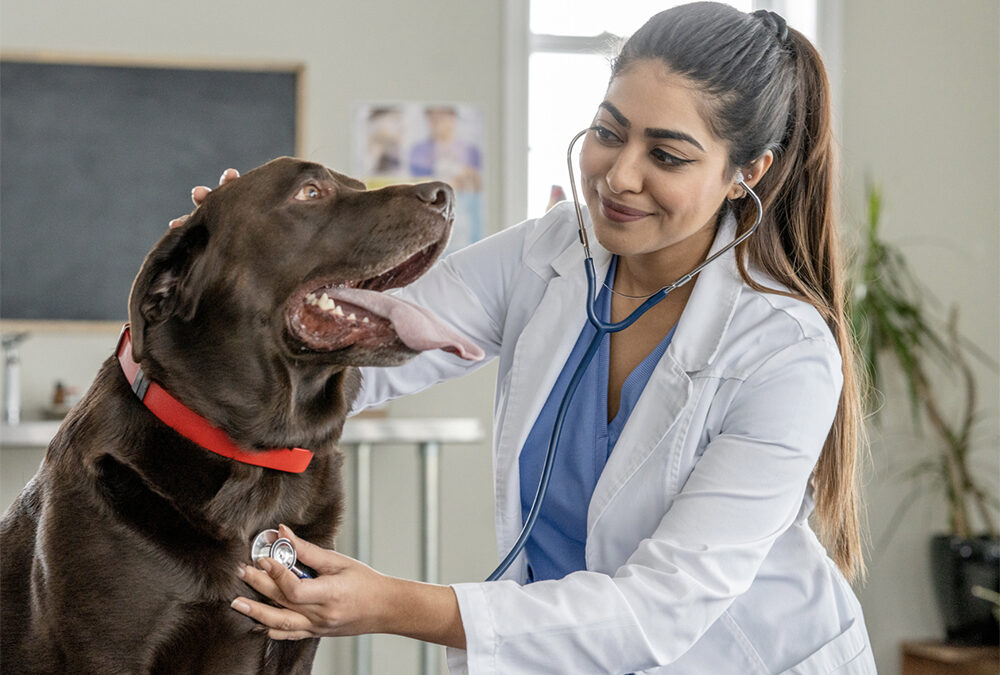According to the American Kennel Club, about 10 percent of all dogs will develop a heart disease over the course of their lifetime. A diagnosis of heart disease, even just several years ago, usually was not promising. However, with advancements in research, health testing, careful breeding in purebred dogs, and more access to board-certified cardiologists, this may no longer be the case for most dogs.
Heart disease in dogs is either congenital or acquired. Congenital diseases are present from birth, while acquired ones develop later in life.
Mitral valve disease is the most common heart disease found in dogs. The mitral valve is found on the left side of the heart between the ventricle and atrium. This degenerative disease starts when the valve fails to close properly, resulting in blood flowing backward due to the loose seal. Over the course of time, the valve will continue to weaken, and the heart will not be able to efficiently pump blood to the body. The backward flow could also lead to congestive heart failure and fluid in the lungs.
Symptoms of mitral valve disease may start with a heart murmur. Physical signs of mitral valve disease include a constant hacking cough and gagging. Another sign is a lack of stamina, meaning your dog would like to walk farther or play more, but they don’t have the wind to do it. This is different from lethargy, meaning the dog has no desire to move at all.
Mitral valve disease appears to be more common in smaller dogs and may be genetic in some breeds. More often, however, the condition is acquired as dogs age. At one time, it was the leading cause of death in the Cavalier King Charles Spaniel breed. Health testing and not breeding dogs with bad hearts has drastically reduced the incidences of mitral valve disease in the breed.
Not all heart murmurs mean that a dog has mitral valve disease. Grading systems for both heart murmurs and mitral valve disease help determine treatment. Murmurs are graded from one, the least severe, to six, the worst. Mitral valve disease is graded from A, the least severe, to D, the worst. Mitral valve disease takes time to “go bad,” so the first sign may just be a low-grade heart murmur. Weakening of the valve sometimes takes years to develop. Asymptomatic heart murmurs and Stage A mitral valve disease might not warrant any medical intervention but will be something both you and your vet keep an eye on.
If your dog is symptomatic, your vet will suggest seeing a veterinary cardiologist who is able to conduct a more thorough exam. Blood work, X-rays to see the size of the heart, a color echocardiogram, and ultrasound are all tools used to diagnose heart issues. The cardiologist may also suggest that your dog wear a Holter monitor at home, which is a portable device that continuously monitors the electrical activity of the heart. The data gathered is then used to form a treatment plan.
Mitral valve disease is not curable but can be managed. The prognosis is based on the stage of the disease. Dogs in stages A or B rarely have their lifespan shortened by the disease. Stage B is usually when medications are used to treat the signs of the disease but, again, not to cure them. The prognosis of Stage C or D is considered “guarded.” Research into mitral valve disease shows that dogs that have the early stages may benefit from getting a properly balanced diet that includes a proper amount of protein, omega-3, medium chain triglycerides, magnesium, and vitamin E that help overstressed heart muscles.
I do know several dogs with mitral valve disease that have what I would consider almost perfectly normal lives with the use of medications, keeping the dogs fit, and keeping up with visits to the cardiologist. If you suspect your dog has any kind of heart issue, finding out sooner rather than later can make a huge difference in their quality and length of life.
If you have any questions, please feel free to email me at heidi@fouronthefloordogtraining.net.
Heidi Clayton started Four On the Floor Dog Training to provide positive, reward-based dog training in South Jersey. She breeds, trains and shows bull terriers under the SoraBully’s Bull Terriers kennel name. Email questions to heidi@fouronthefloordogtraining.net or learn more at https://fouronthefloordogtraining.net


















